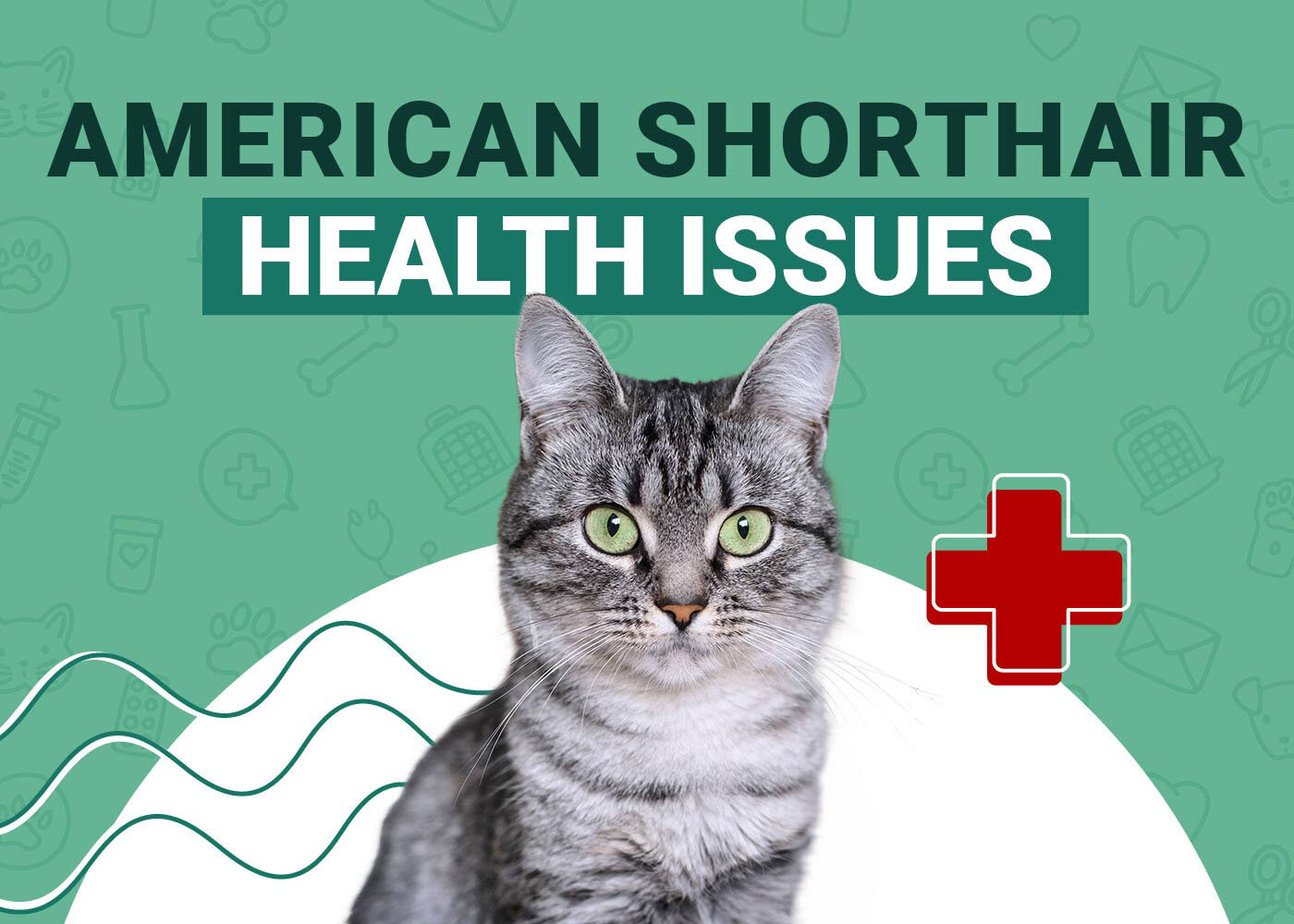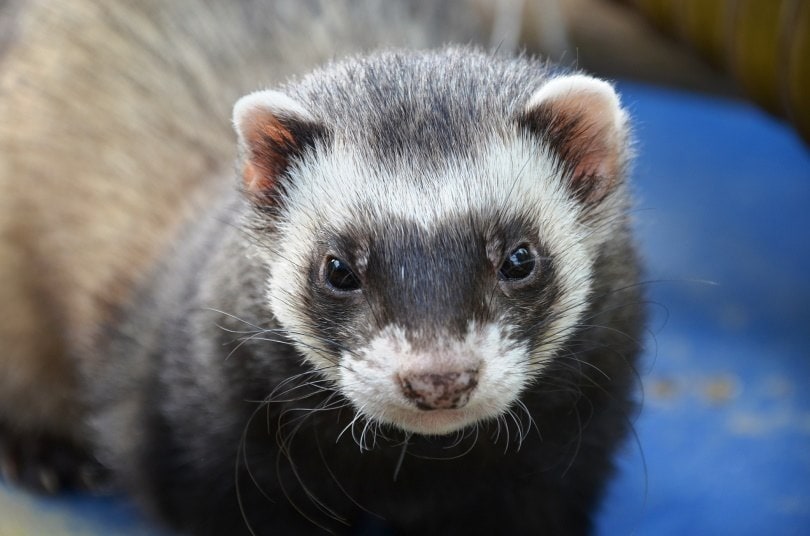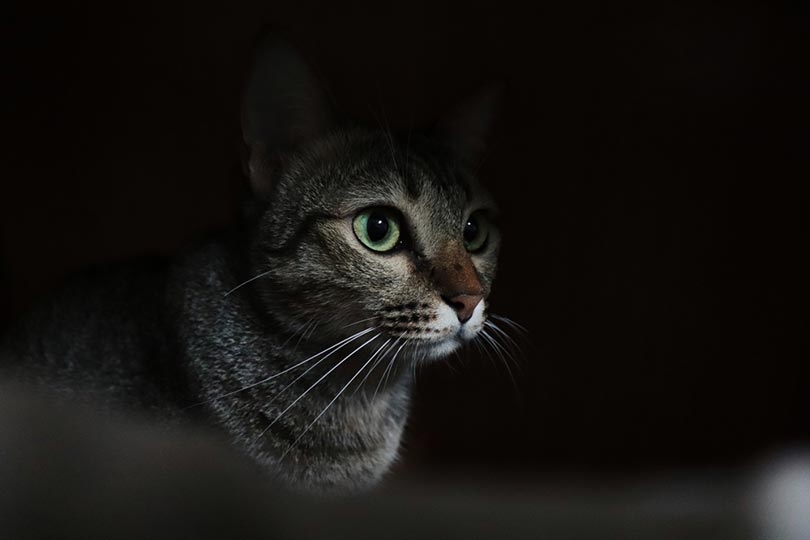VET APPROVED

The information is current and up-to-date in accordance with the latest veterinarian research.
Learn more »Click to Skip Ahead
American Shorthairs are loved because of their affectionate companionship, even temperament, and quiet voice. When bred and cared for correctly, these cats tend to be very healthy and live long lives.
However, there are some common health concerns to be aware of that are more commonly linked to felines in general, rather than the actual American Shorthair breed. Listed below are the 16 most common health concerns for felines in general, while very few have been specifically linked as high-risk conditions in American Shorthairs. Some of these health concerns are preventable, whereas others are not.

Top 15 American Shorthair Cat Health Problems
Please note that the majority of listed health conditions below are actually the ones commonly observed in all cat breeds, and when a specific predisposition of American Shorthair cats is present towards a certain condition, this will be clearly stated.
1. Allergies
| Seriousness | Variable |
| Preventable | No |
| Treatable | Yes |
Just as humans can have allergies, so can cats. Cats can be allergic to environmental allergens such as pollen, mold, grass and mites, flea saliva, as well as food. Allergies mainly lead to skin signs due to excessive scratching and grooming, while upper respiratory and digestive signs are far less common.
There’s no way to prevent allergies, but you can treat them. Talk to your vet to identify the allergen and get your cat on allergy medication if needed. Even though allergies tend not to be serious, they certainly are uncomfortable for your cat and will get worse without proper management, and it’s important to get them treated.
2. Arterial Thromboembolism (FATE)
| Seriousness | Serious/fatal |
| Preventable | Sometimes with certain medication |
| Treatable | In rare cases, depending on the extent |
FATE is often a side effect of heart disease and occurs whenever blood clots develop inside the heart and travel to distant blood vessels. This usually happens in the aorta towards the back legs at its bifurcation, which causes the hind legs to suddenly lose oxygenated arterial blood flow. Cats develop cold and cyanotic legs, severe pain, and paralysis as a result.
FATE can sadly cause sudden death, it can also show as the cat having severe breathing difficulties, or not being able to use their back legs. It’s imperative to get your cat to an emergency clinic as soon as you suspect FATE. Unfortunately, in the majority of cases, there is no cure.
3. Calicivirus
| Seriousness | Moderate |
| Preventable | Partially with timely vaccination |
| Treatable | Yes, but only symptomatic |
Feline calicivirus is a contagious disease that causes both respiratory and oral diseases in cats. It is prevalent in shelters and breeding colonies. Most cats can recover from this infection, but it can be deadly in the case of a very particular strain of the virus.
Although calicivirus can be fatal, there are vaccines to help protect your cat, which will reduce the signs of illness in case they catch the virus. Cats that receive their vaccines regularly are at lower risk for this disease. Talk to your vet to make sure your cat has all the vaccines they need to stay healthy.
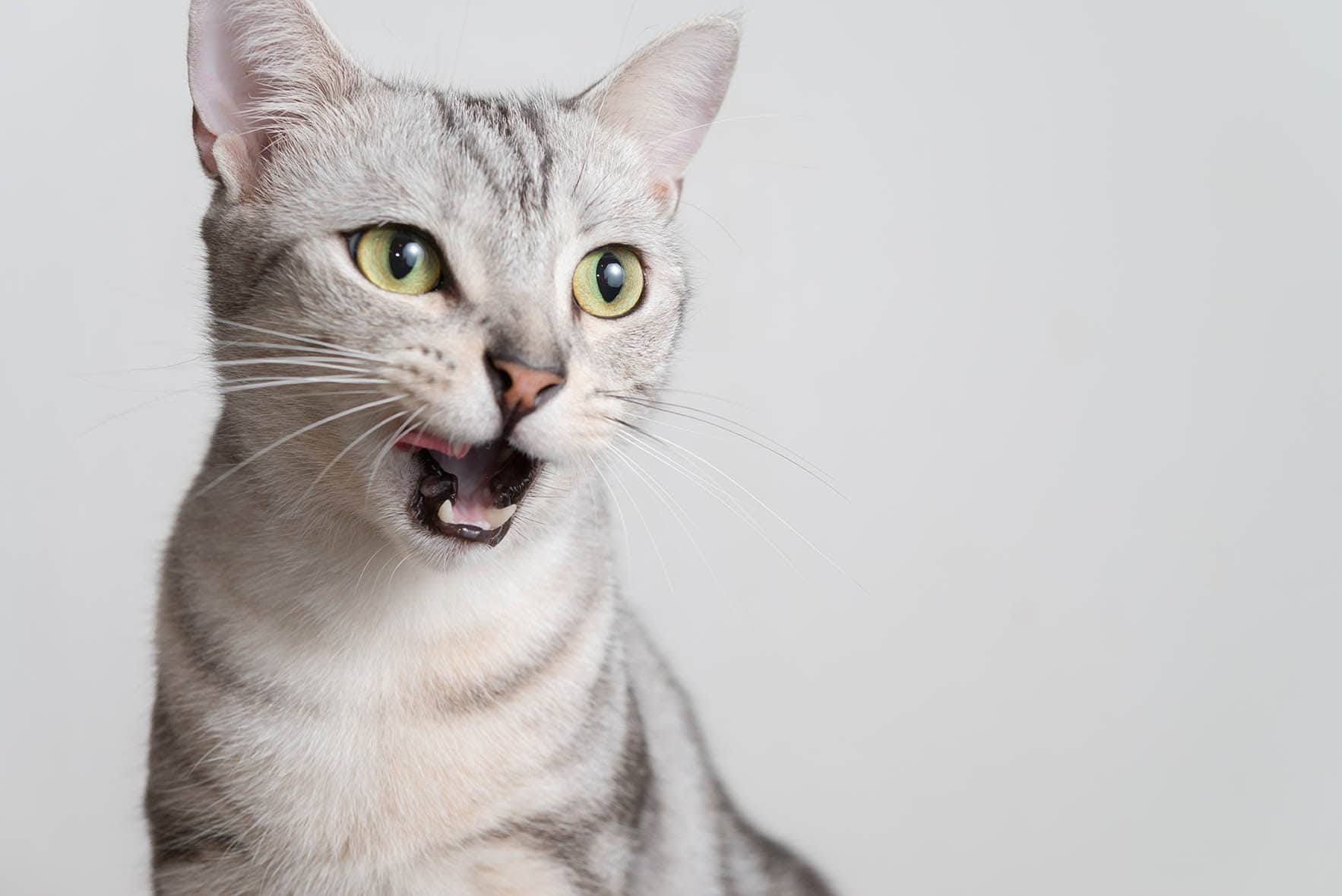
4. Deafness (Genetic)
| Seriousness | Mild to moderate |
| Preventable | No |
| Treatable | No |
Deafness has been a common issue in certain breeds, especially those that have white fur and blue eyes. Hereditary deafness has been reported in American Shorthairs. There is no way to prevent or treat deafness.
Although it is neither preventable nor treatable, deafness in your American Shorthair should not stop them from living a happy and healthy life.
5. Dental Disease
| Seriousness | Moderate to severe |
| Preventable | Mostly |
| Treatable | Yes |
Dental disease is another common health condition in all cat breeds. Unfortunately, many cat owners don’t realize that they need to brush their cat’s teeth. Without frequent brushing, dental disease can and is likely to develop.
If left untreated, dental disease can be pretty serious. It leads to stinky breath and painful teeth, and gums. You can prevent and treat dental disease. Brushing your cat’s teeth frequently will largely prevent and reduce this problem. If dental disease has already set in, talk to your vet about how to treat it through dental procedures.
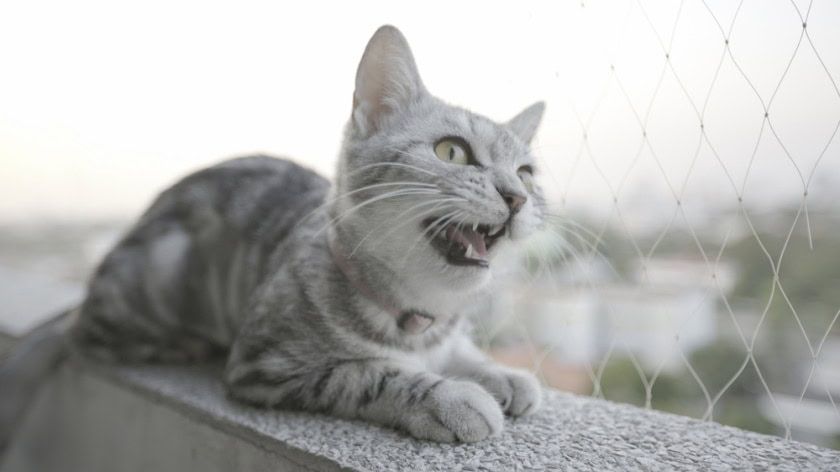
6. Diabetes
| Seriousness | Serious |
| Preventable | In some cases |
| Treatable | Yes |
Diabetes in cats usually develops in middle to older age. Diabetes is one of the more common illnesses in American Shorthairs and can be linked to obesity.
Ensuring your cat has a healthy weight and lifestyle may help prevent such issues. If your cat develops diabetes, talk to your vet about treatment and creating a healthy routine.
7. Feline Lower Urinary Tract Disease (FLUTD)
| Seriousness | Serious |
| Preventable | In some cases |
| Treatable | Yes |
Everyone hates it when their cat goes to the bathroom outside the litter box. This is a common occurrence in kittens, but it is not common in adult cats. If your adult cat is having trouble making it to the litter box, something is likely wrong.
Many cats can develop FLUTD, and it is often related to stress. This condition requires veterinary care. It can be an emergency in male cats if they cannot urinate. Once diagnosed, the condition can be treated using certain medications, stress reduction, and sometimes surgery.
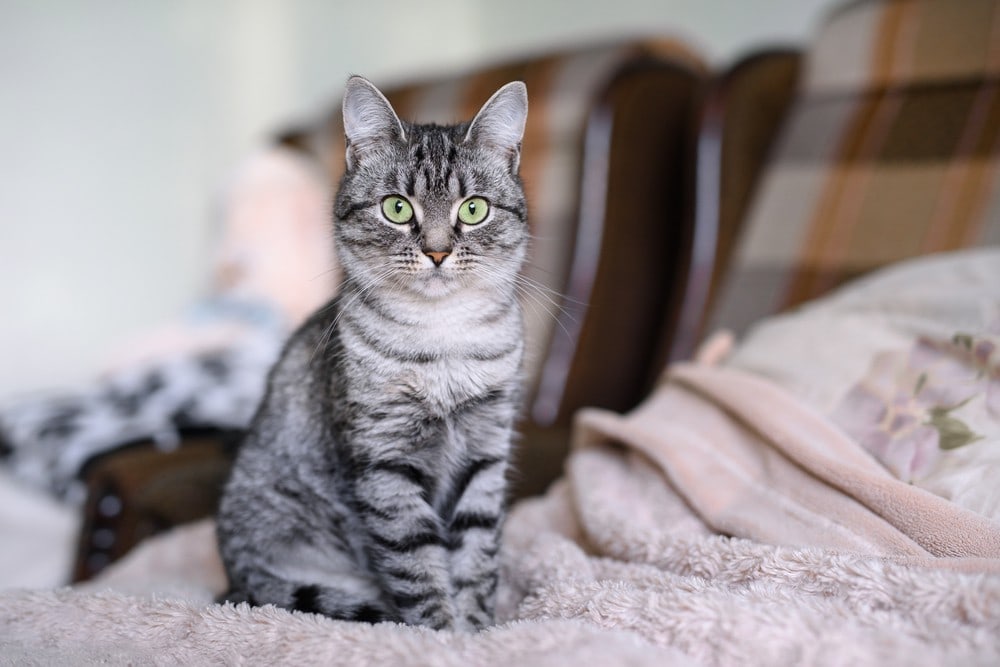
8. Heart Disease (Hereditary)
| Seriousness | Serious |
| Preventable | No |
| Treatable | Yes, depending on the extent |
American Shorthairs can develop inherited diseases, such as cardiomyopathy. This is a medical term for heart muscle disease. There are different types of this disease, most of which are inherited. This is one of the few known hereditary diseases in American Shorthairs.
If you catch the disease early, there are some treatment options. Proper breeding and health testing of the parents and litter can help to diminish the chances of inherited heart disease. Ensure your can has an adequate level of taurine in their diet to reduce the risk of heart muscle disease.
9. Hyperthyroidism
| Seriousness | Serious |
| Preventable | No |
| Treatable | Yes |
The thyroid gland helps control a cat’s metabolic processes. In many cats, especially middle-aged to old ones, tumors (usually benign) can develop in this gland, which causes their thyroid to produce more hormones than it should.
Due to the hyperactive thyroid, the cat can experience weight loss, vomiting, diarrhea, increased thirst, heart disease, and high blood pressure. The good news is that there are a lot of effective treatment options today, from diets to medications, radioactive iodine, and surgery to effect a cure.
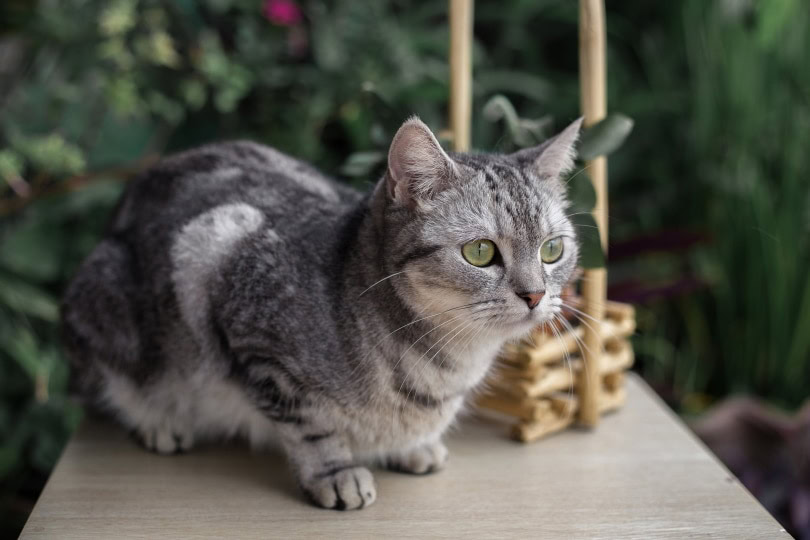
10. Obesity
| Seriousness | Serious |
| Preventable | Yes |
| Treatable | Yes |
Obesity is one of the most common health concerns in almost every breed of cat, including American Shorthairs. Obesity is caused by excessive feeding and insufficient exercise. Obesity can predispose to several other ailments, including diabetes, arthritis, and other severe health conditions.
The good news is that obesity is both preventable and treatable. Feeding your American Shorthair a healthy diet will help to combat obesity. Additionally, play with your cat daily and provide opportunities to entertain themselves too. If your cat ends up overweight, talk to your vet to create a diet plan for your cat.
11. Panleukopenia (FPV)
| Seriousness | Serious |
| Preventable | Yes |
| Treatable | Yes, but only symptomatic |
Feline Parvovirus was the leading cause of cat death in the past, but it is relatively rare today thanks to regular vaccination. Even so, it is highly contagious. If one cat has FPV, there is a very good chance that any cats around will develop FPV as well.
FPV currently has an effective vaccine. These vaccines are considered part of a cat’s core vaccines. Without the vaccine, some cats may pass away, especially kittens. Prevention is the best way for your American Shorthair to remain healthy.
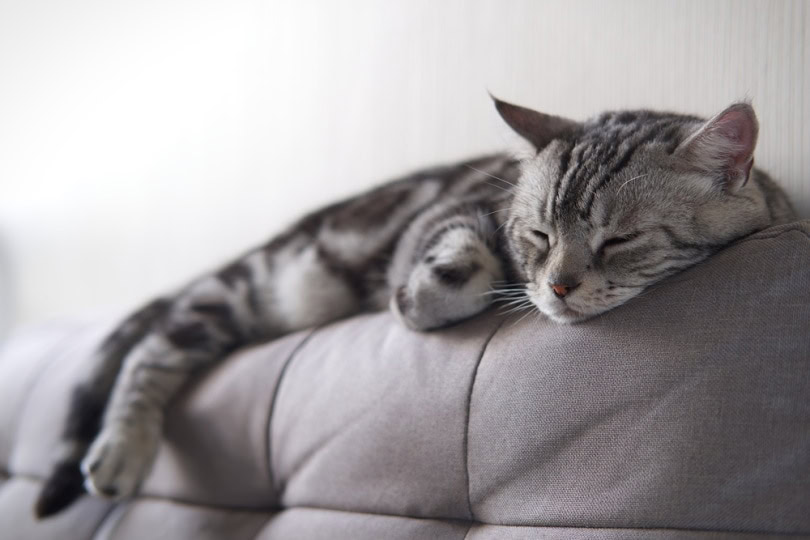
12. Parasites
| Seriousness | Moderate |
| Preventable | Yes |
| Treatable | Yes |
American Shorthairs are just as susceptible to parasites as other animals. It’s essential to protect your American Shorthair from various parasites, including fleas, ticks, mites, hookworms, heartworms, roundworms, and whipworms.
When left untreated, parasites can cause severe illness, but they are easily prevented and treated. Your vet will recommend medication to help prevent the parasites. If parasites are suspected, your vet will be able to perform an exam to provide the cat with the medicine they need for treatment.
13. Polycystic Kidney Disease (Hereditary)
| Seriousness | Serious |
| Preventable | No |
| Treatable | No |
Polycystic kidney disease is not preventable. It is the result of a defective gene, making it an inherited issue. This disease is most common in Persians, but it is seen in American Shorthairs too. Genetic screening and responsible breeding will help to reduce the occurrence of this disease.
Unfortunately, there is no treatment for polycystic kidney disease, but there are medications and diets that can help to slow the process. The best treatment option is to catch it early enough so that your cat can go on medications as soon as possible.
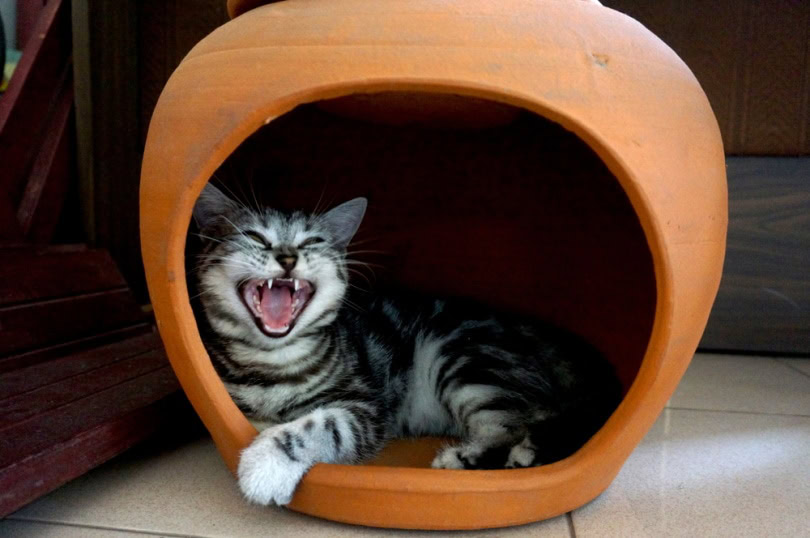
14. Kidney Disease
| Seriousness | Yes |
| Preventable | Generally, no, but it can be slowed |
| Treatable | Not curable, but can be slowed |
Kidney disease happens when the kidneys do not properly clean waste from the blood and body. Whenever this happens, the condition can be progressive and eventually fatal in cats, especially older ones.
In many cases, kidney disease is chronic, and cats can live with it for months and years alongside regular check-ups and medications. In some cases, there can be acute kidney damage, which is treated more intensely and can carry a good prognosis if caught early, depending on the cause. You can help control kidney disease with special diets and medications. If you suspect your cat’s kidneys are not working properly, see your vet immediately.
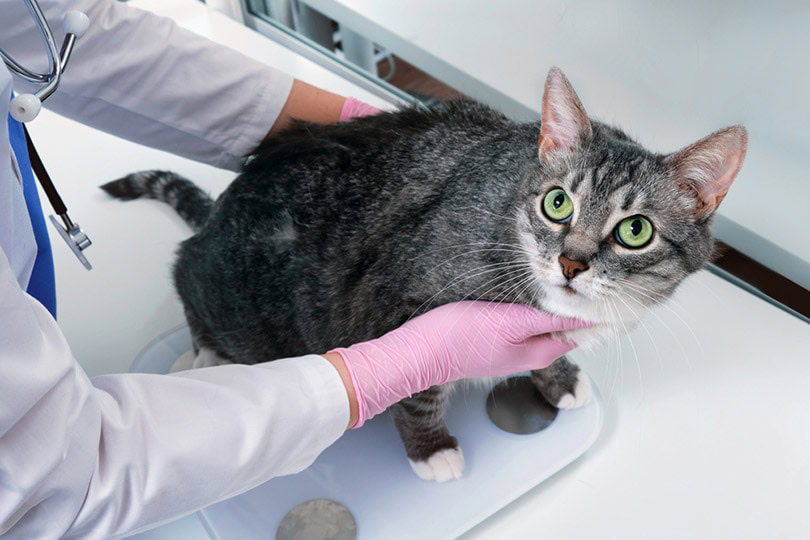
15. Rhinotracheitis
| Seriousness | Moderate |
| Preventable | Partially with timely vaccination |
| Treatable | Yes, but only symptomatic |
Rhinotracheitis is a type of respiratory infectious disease. It is caused by a herpesvirus, but vaccines can prevent it or reduce the signs of illness. Talk to your vet to learn if your cat needs to be treated or get the vaccine against Rhinotracheitis.
How Can I Ensure My American Shorthair Is Healthy?
If you are getting an American Shorthair, you likely want to do everything in your power to keep them healthy. Luckily, this breed is generally considered healthy, especially if you focus on the following two factors:
Good Breeding
Only select a cat if you know they come from a responsible and reputable breeder. Good breeding will prevent most inherited diseases, so that you only have to focus on diseases within your control. Talk to the breeder directly or get a veterinarian to do a full exam and available genetic testing on your cat to determine if they have any inherited diseases.
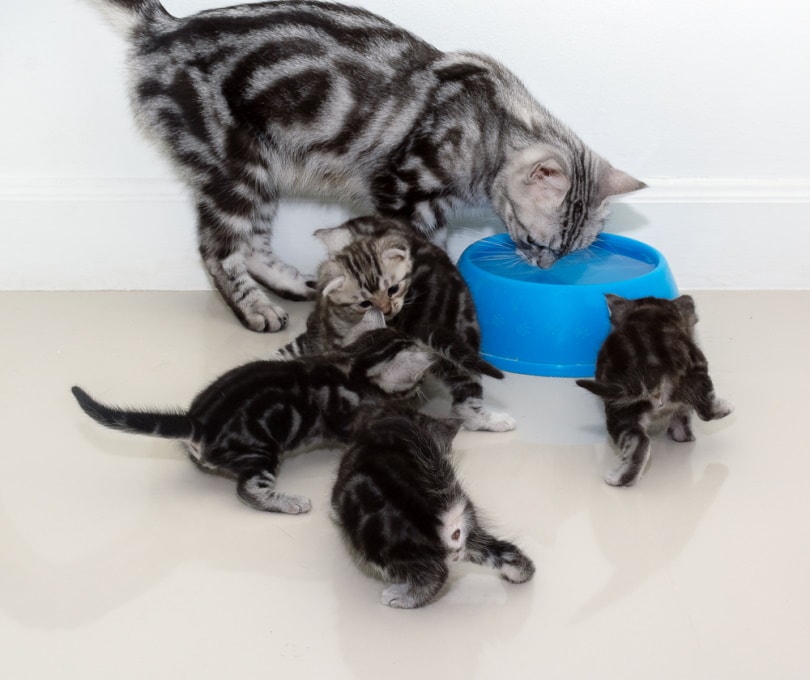
Healthy Lifestyle
Providing your cat with a healthy lifestyle is one of the best ways to keep them around for years to come. Make sure your American Shorthair has access to plenty of water and a healthy diet. Lastly, ensure your cat gets exercise, preventative health care, and dental care. Doing these few easy things will vastly diminish the chances of your cat developing serious issues.

Conclusion
Just like all cats, American Shorthairs can develop some serious health concerns. The 15 health concerns above are only some of the most common. Although 15 health concerns may seem like a lot, they are mostly possible in any cat, and some of them are preventable. American Shorthairs are actually one of the healthier breeds you can have.
- Animal Health Center
- Pet Obesity Prevention
- VCA Animal Hospitals
- Merck Veterinary Manual
- UC Davis Veterinary Medicine
- Glencoe Animal Hospital
- Harlingen Veterinary Clinic
- Carolina Veterinary Specialists
- PetMD
- National Library of Medicine
- Vet Cornell
- Vet Cornell Feline Diabetes
- American Veterinary Medical Association
- Science Direct
Featured Image Credit: Puripat Lertpunyaroj, Shutterstock
